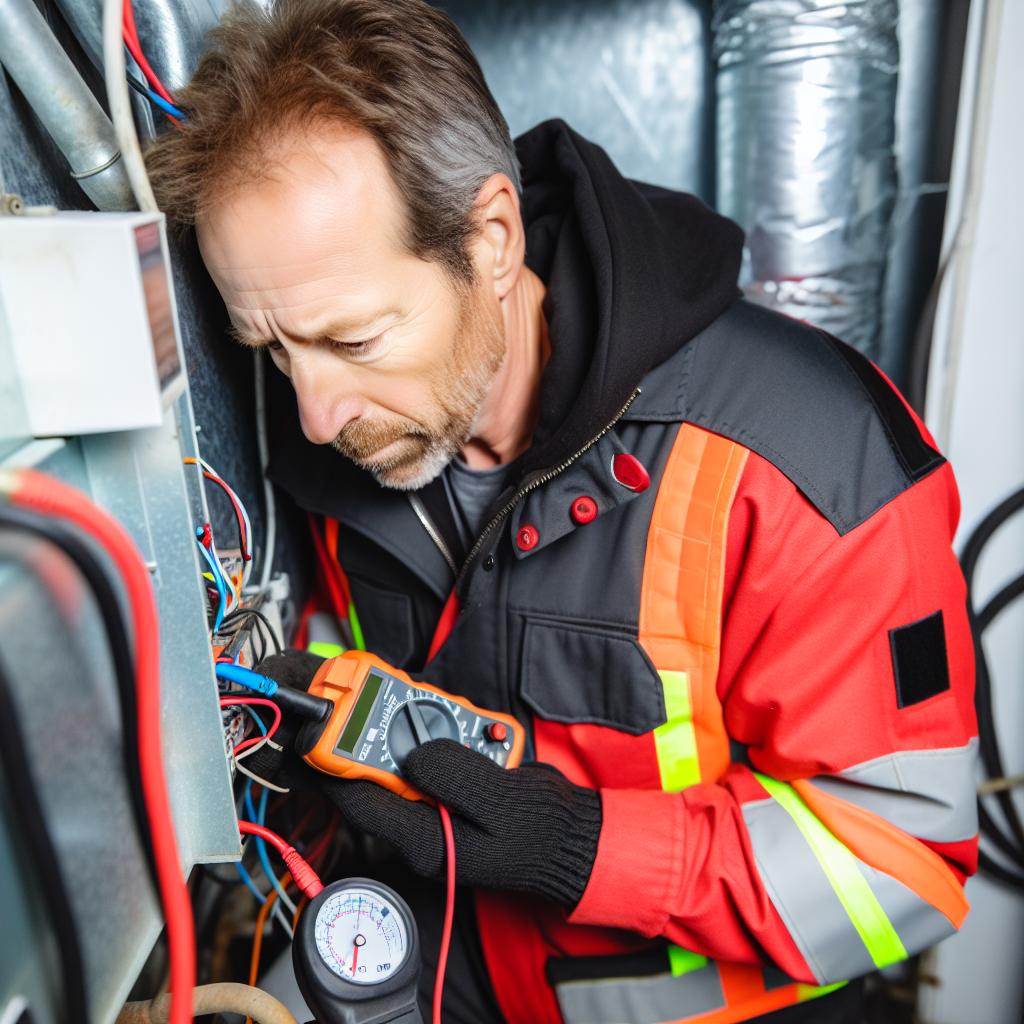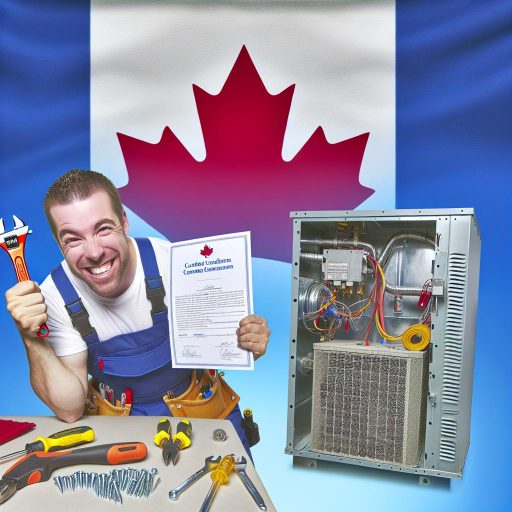Understanding the Complexity of HVAC Systems and Their Components
Overview of HVAC Systems
HVAC systems control heating, ventilation, and air conditioning in buildings.
These systems help maintain comfortable indoor environments.
Essentially, they balance temperature and indoor air quality.
Key Components of HVAC Systems
HVAC systems consist of various critical components.
These include furnaces, air conditioners, and heat pumps.
Fans and ductwork play vital roles in air circulation.
Additionally, thermostats help manage system settings.
Common Challenges in Understanding HVAC Systems
HVAC technicians often face complex issues with system components.
Identifying the root cause of malfunctions can be challenging.
Moreover, systems vary significantly in make and model.
This diversity adds to the complexity of troubleshooting.
Technicians’ Skill Requirements
Technicians must possess a broad range of skills.
These skills include electrical knowledge and mechanical aptitude.
Additionally, effective communication is crucial with clients.
Staying Updated with Technology
Advancements in HVAC technology continue to evolve rapidly.
Technicians must stay informed about these changes.
Regular training and certification are essential for success.
Navigating Safety Regulations and Compliance Standards in HVAC Work
Understanding Safety Regulations
HVAC technicians must constantly navigate a complex web of safety regulations.
These regulations aim to protect both workers and clients.
Familiarizing oneself with local, state, and federal laws is essential.
For example, the Occupational Safety and Health Administration (OSHA) sets strict guidelines.
Technicians need to understand these guidelines to avoid penalties.
In addition, staying updated on changes in regulations is critical.
Importance of Compliance Standards
Compliance standards ensure that HVAC systems operate safely and efficiently.
Technicians must follow industry standards such as ASHRAE and ANSI.
Unlock Your Career Potential
Visualize a clear path to success with our tailored Career Consulting service. Personalized insights in just 1-3 days.
Get StartedThese standards provide guidelines for installation and maintenance procedures.
Failure to adhere can result in serious safety issues.
Moreover, non-compliance can damage a technician’s reputation.
Technicians must keep detailed records of their work to demonstrate compliance.
Training and Certification
Proper training is crucial for HVAC technicians to understand safety regulations.
Certification programs help technicians develop necessary skills and knowledge.
Many states require specific certifications to operate legally.
Continuous education helps technicians stay current with evolving standards.
Technicians should attend workshops and training sessions regularly.
Networking with peers can enhance knowledge sharing about compliance challenges.
Tools for Compliance Management
Using technology can simplify compliance management for technicians.
Software tools help track regulations and deadlines effectively.
Mobile apps can assist in documenting compliance during jobs.
Furthermore, checklists ensure all safety protocols are followed.
These tools provide reassurance of meeting regulatory requirements.
Challenges in Implementation
Implementing safety regulations can pose challenges to HVAC technicians.
Time constraints often limit the ability to adhere to all guidelines.
Additionally, some technicians may resist changes to established practices.
Finding the right balance between efficiency and compliance is vital.
Moreover, lack of resources can hinder full compliance in smaller firms.
Encouraging a culture of safety can help overcome these challenges.
Dealing with the Physical Demands and Strenuous Aspects of the Job
Understanding the Job’s Physical Nature
The HVAC trade requires physical strength and endurance.
Technicians often lift heavy equipment and materials.
They frequently work in confined spaces and awkward positions.
Moreover, prolonged periods of standing or kneeling are common.
These physical demands can lead to fatigue and discomfort.
Importance of Safety Measures
Safety measures are crucial to prevent injuries.
Technicians must use appropriate lifting techniques.
Wearing safety gear like gloves and goggles is essential.
Additionally, ensuring proper ventilation while working is important.
Managing Weather Conditions
Weather can significantly impact HVAC work.
Hot summer days make outdoor tasks exhausting.
Moreover, winter jobs may involve working in cold conditions.
Technicians often need to adapt to extreme temperatures.
This adaptability is vital for productivity and safety.
Navigating Tools and Equipment
Using specialized tools and equipment is a daily requirement.
Familiarity with tools enhances efficiency on the job.
However, improper use can lead to accidents and injuries.
Continual training on new technologies is necessary.
Dealing with Fatigue and Stress
Work-related fatigue is an ongoing challenge.
Technicians often contend with tight deadlines.
This stress can affect their mental and physical health.
Employers can help by promoting a supportive environment.
Building Resilience and Endurance
Maintaining good physical health is essential for success.
Regular exercise can improve strength and endurance.
A balanced diet also plays a vital role in energy levels.
Furthermore, seeking professional development opportunities helps foster resilience.
Gain More Insights: Common Challenges Faced by Professional Upholsterers
Managing Time Effectively During Service Calls and Installations
Understanding Time Management Challenges
HVAC technicians face numerous time management challenges daily.
Service calls often require quick responses to unexpected issues.
Moreover, installations can be unpredictable regarding time requirements.
Additionally, traffic and travel times can disrupt schedules.
Implementing Effective Strategies
Planning plays a crucial role in effective time management.
Technicians should create detailed service schedules before departing.
Using mobile applications helps to optimize routes and appointments.
Prioritizing tasks based on urgency can streamline workflows significantly.
Adapting to Customer Needs
Every client has unique demands that can affect time management.
Understanding customer expectations enhances service quality.
Technicians must communicate openly about potential delays or issues.
This transparency fosters trust and keeps customers informed.
Continuous Learning and Training
Ongoing education enhances technicians’ skills, improving efficiency.
Training programs can teach new techniques and tools for managing time.
Furthermore, sharing best practices among peers can aid all technicians.
Participating in workshops offers valuable insights into industry standards.
You Might Also Like: Green Roofing and Opportunities for Canadian Roofers
Handling Customer Expectations and Communication Challenges
Establishing Clear Communication
Effective communication forms the foundation of successful HVAC service.
HVAC technicians should always clarify their scope of work upfront.
This helps prevent misunderstandings later in the project.
Using simple language enhances understanding with customers.
Technicians frequently encounter technical terms that confuse clients.
To bridge this gap, they must explain terms when necessary.
Managing Customer Expectations
Setting realistic expectations is critical for customer satisfaction.
Technicians should inform clients about potential delays in service.
This can happen due to parts availability or unexpected issues.
Moreover, outlining the stages of service helps customers feel involved.
Clients appreciate understanding what to expect at each step.
Addressing Customer Concerns
Customers may express anxiety over issues like costs and time.
Technicians must be prepared to answer frequently asked questions.
Reassuring clients about quality service fosters trust.
Listening attentively to client concerns is also essential.
This shows that the technician values the client’s input.
Follow-Up Communication
Follow-up after service ensures ongoing customer satisfaction.
Technicians should reach out to clients to confirm satisfaction.
This practice enhances relationships and builds loyalty.
In addition, feedback can help improve future service quality.
Technicians can request reviews and referrals tactfully.
Training in Customer Service Skills
Overall, implementing customer service training benefits HVAC professionals.
Workshops can aid technicians in practicing communication strategies.
Learning conflict resolution techniques can also be beneficial.
Role-playing different client scenarios prepares technicians effectively.
Ultimately, these skills enhance the customer experience significantly.
Gain More Insights: Effective Marketing Strategies for Upholstery Services

Staying Updated with Evolving Technologies and Equipment in the HVAC Industry
Rapid Technological Advancements
The HVAC industry continuously evolves with new technologies.
Technicians must stay informed about these rapid changes.
New systems often include advanced controls and efficiency measures.
Additionally, smart home technology integration is becoming prevalent.
Challenges in Training and Certification
Training programs need regular updates to cover new technologies.
Technicians may face difficulties in accessing relevant training resources.
Certification programs also require updates to remain valid.
Without proper training, technicians may struggle with modern systems.
Innovations in Equipment
Modern HVAC systems involve complex components and functionalities.
Understanding these innovations is crucial for effective repairs.
Moreover, technicians must adapt to new refrigerants and safety standards.
Obsolete equipment can hinder overall service efficiency.
Accessing Resources and Information
Staying informed requires dedication and access to current resources.
Industry publications and seminars can provide valuable insights.
Networking with peers also enhances knowledge sharing.
Online platforms and forums offer additional information and support.
Implementing Sustainable Practices
Sustainability is becoming increasingly important in HVAC operations.
Technicians must learn about eco-friendly technologies.
Energy-efficient solutions can benefit both clients and the environment.
Knowledge of green technologies is an essential skill for today’s technician.
Explore Further: How HVAC Technicians Ensure Indoor Air Quality
Addressing Common Issues with HVAC Systems
Identifying Leaks
HVAC systems often develop leaks over time.
Localizing these leaks requires a keen eye and proper tools.
Technicians often use gas leak detectors for this purpose.
Visual inspections are also essential for finding leaks.
Common leak sources include ductwork and refrigerant lines.
Tackling Inefficiencies
Inefficiencies can arise from various factors in HVAC systems.
Dirty filters significantly reduce system performance.
Regular filter changes help maintain optimal airflow.
Additionally, improper system sizing leads to inefficiencies.
Technicians should assess the system’s capacity for the space.
Improving Air Quality
Air quality impacts both comfort and health in indoor environments.
Dirty ducts can harbor allergens and pollutants.
Regular duct cleaning is critical for maintaining air quality.
Using air purifiers can enhance indoor air quality further.
Moreover, proper humidity control is essential for comfort.
Maintaining Components
Regular maintenance of HVAC components is essential for longevity.
Technicians should routinely check and service key parts.
This includes motors, coils, and compressors.
Routine lubrication of moving parts helps prevent wear.
Furthermore, replacing worn-out parts enhances system reliability.
Understanding System Controls
Modern HVAC systems often feature complex controls.
Technicians must familiarize themselves with programmable thermostats.
Proper setup of these controls ensures efficient operation.
Additionally, educating clients on operation can prevent misuse.
Training on system diagnostics can also optimize performance.
Overcoming Seasonal Fluctuations in Workload and Demand for Services
Understanding Seasonal Demand Variability
Seasonal variations can create unpredictable workloads for HVAC technicians.
During summer and winter, demand typically spikes significantly.
Conversely, spring and fall periods often face lower service requests.
These fluctuations can lead to inconsistent income for technicians.
Strategies for Managing Workload
To tackle these challenges, technicians can implement various strategies.
Firstly, diversifying service offerings can help maintain steady work throughout the year.
This might include providing annual maintenance services or energy audits.
Secondly, collaborating with other local businesses can lead to more job opportunities.
Network with plumbers or electricians to create service packages.
Optimizing Scheduling and Resources
Effective scheduling is critical to managing seasonal demand.
Utilize scheduling software to optimize appointments and projects efficiently.
During off-peak seasons, technicians can focus on training and certification.
This enhances skills and prepares for upcoming busy seasons.
Building Customer Loyalty
Establishing relationships with clients can mitigate workload pressures.
Implement loyalty programs to encourage repeat business and referrals.
Communicate with clients during off-peak periods about maintaining their systems.
Educating customers about regular maintenance enhances customer retention.
Preparing for Peak Seasons
Preparing for busy months is essential for HVAC technicians.
Increasing marketing efforts before peak seasons can boost visibility.
Ensure staff levels are adequate to handle increased demand effectively.
This may involve hiring seasonal help or offering overtime to current employees.
Additional Resources
Mechanic says newer Toyotas have “a lot of problems” : r/Toyota




